一般将来时的用法
- 格式:doc
- 大小:15.00 KB
- 文档页数:3
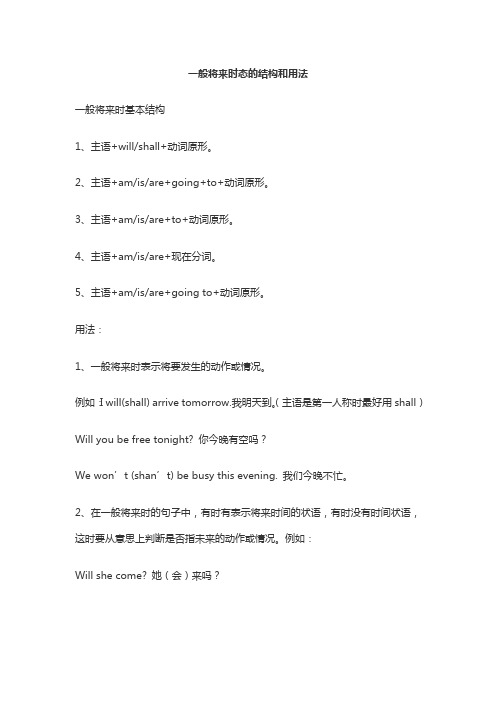
一般将来时态的结构和用法一般将来时基本结构1、主语+will/shall+动词原形。
2、主语+am/is/are+going+to+动词原形。
3、主语+am/is/are+to+动词原形。
4、主语+am/is/are+现在分词。
5、主语+am/is/are+going to+动词原形。
用法:1、一般将来时表示将要发生的动作或情况。
例如:I will(shall) arrive tomorrow.我明天到。
(主语是第一人称时最好用shall)Will you be free tonight? 你今晚有空吗?We won’t (shan’t) be busy this evening. 我们今晚不忙。
2、在一般将来时的句子中,有时有表示将来时间的状语,有时没有时间状语,这时要从意思上判断是否指未来的动作或情况。
例如:Will she come? 她(会)来吗?3、在以第一人称I或we作主语的问句中,一般使用助动词shall,这时或是征求对方的意见,或是询问一个情况(b):a. Where shall we meet? 我们在哪儿碰头?b. Shall we have any classes tomorrow?明天我们有课吗?在这类问句中,近几年来也有不少人用will,特别是在美国。
例如:How will I get there? 我怎么去?扩展资料:一般将来时表示将来某一时段的动作或状态,或将来某一段时间内经常的动作或状态。
在英语时态中,“时“指动作发生的时间,”态“指动作的样子和状态。
一般将来时常常和表示将来的时间状语连用。
如:tomorrow(明天),next week (下周);in the future(将来);in a year(一年以后)等。
一般将来时由助动词shall(第一人称),will(所有人称)动词原形构成。
美式英语则不管什么人称,一律用will。
或用主语+be动词+ going to 动词(be going to)。
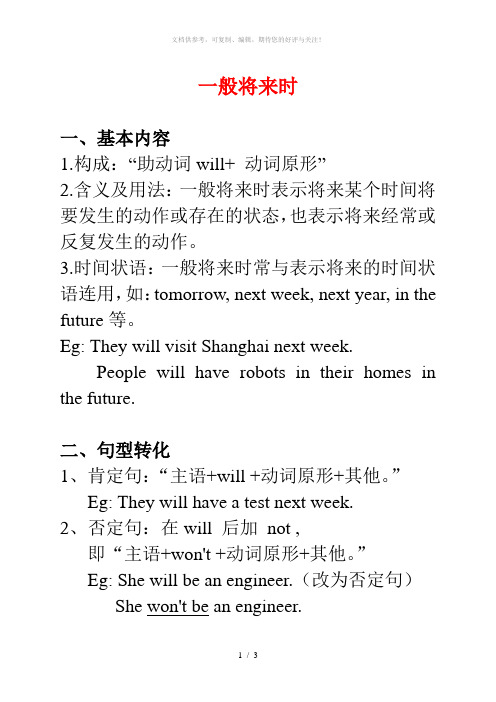
一般将来时一、基本内容1.构成:“助动词will+ 动词原形”2.含义及用法:一般将来时表示将来某个时间将要发生的动作或存在的状态,也表示将来经常或反复发生的动作。
3.时间状语:一般将来时常与表示将来的时间状语连用,如:tomorrow, next week, next year, in the future等。
Eg: They will visit Shanghai next week.People will have robots in their homes in the future.二、句型转化1、肯定句:“主语+will +动词原形+其他。
”Eg: They will have a test next week.2、否定句:在will 后加not ,即“主语+won't +动词原形+其他。
”Eg: She will be an engineer.(改为否定句)She won't be an engineer.3、一般疑问句:将will提到主语前面,即“Will+ 主语+动词原形+其他?”回答时使用yes/no.Eg: He will live in New York in 10 years. (改为一般疑问句并作肯定回答)Will he live in New York in 10 years?Yes, he will.三、注意事项1、Will 常表示客观的将来,也可表示“带意愿色彩的将来”,也可表示“委婉客气的邀请或命令”Eg: He will be 18 years olds next month.下个月他将满18岁。
I will tell you all about it. 我愿意把所有与此相关的事都告诉你。
Will you please close the door? 请你把门关上好吗?2、在疑问句中,主语为第一人称(I 和we)时,常用助动词shall。
Eg:When shall we have the party ?3、There be 句型的一般将来时:肯定句:there will be+.......。
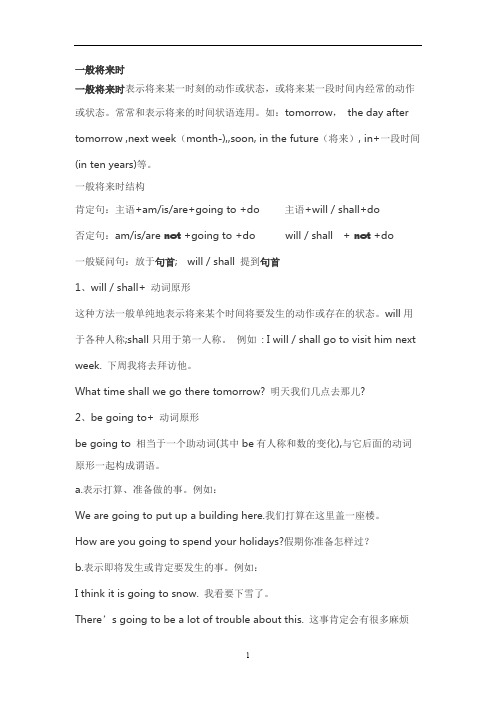
一般将来时一般将来时表示将来某一时刻的动作或状态,或将来某一段时间内经常的动作或状态。
常常和表示将来的时间状语连用。
如:tomorrow,the day after tomorrow ,next week(month-),,soon, in the future(将来), in+一段时间(in ten years)等。
一般将来时结构肯定句:主语+am/is/are+going to +do 主语+will / shall+do否定句:am/is/are not +going to +do will / shall + not +do一般疑问句:放于句首; will / shall 提到句首1、will / shall+ 动词原形这种方法一般单纯地表示将来某个时间将要发生的动作或存在的状态。
will用于各种人称;shall只用于第一人称。
例如: I will / shall go to visit him next week. 下周我将去拜访他。
What time shall we go there tomorrow? 明天我们几点去那儿?2、be going to+ 动词原形be going to 相当于一个助动词(其中be有人称和数的变化),与它后面的动词原形一起构成谓语。
a.表示打算、准备做的事。
例如:We are going to put up a building here.我们打算在这里盖一座楼。
How are you going to spend your holidays?假期你准备怎样过?b.表示即将发生或肯定要发生的事。
例如:I think it is going to snow. 我看要下雪了。
There’s going to be a lot of trouble about this. 这事肯定会有很多麻烦一、选择填空:( ) 1. There __________ a meeting tomorrow afternoon.A. will be going toB. will going to beC. is going to beD. will go to be( ) 2. Charlie ________ here next month.A. isn’t workingB. doesn’t workingC. isn’t going to workingD. won’t work( ) 3. He ________ very busy this week, he ________ free next week.A. will be; isB. is; isC. will be; will beD. is; will be( ) 4. There ________ a dolphin show in the zoo tomorrow evening.A. wasB. is going to haveC. will haveD. is going to be( ) 5. –________ you ________ free tomorrow?– No. I ________ free the day after tomorrow.A. Are; going to; willB. Are; going to be; willC. Are; going to; will beD. Are; going to be; will be ( ) 6. Mother ________ me a nice present on my next birthday.A. will givesB. will giveC. givesD. give( ) 7. – Shall I buy a cup of tea for you?–________. (不,不要。

一般将来时的基本结构和用法
一般将来时用于表示将来发生的动作或事件。
以下是一般将来时的基本结构和用法:
一、基本结构:
1. 肯定句:
- 主语 + will + 动词原形
- I will travel to Japan next week.
我下周将去日本旅行。
- She will study for the exam tomorrow.
她明天将准备考试。
2. 否定句:
- 主语 + will not (won't) + 动词原形
- They won't attend the meeting.
他们不会参加会议。
- He won't forget your birthday.
他不会忘记你的生日。
3. 疑问句:
- Will + 主语 + 动词原形 + 其他?
- Will you come to the party?
你会来参加派对吗?
- Will they finish the project on time?
他们会按时完成项目吗?
二、用法:
- 表示将来发生的动作或事件。
- 表示预测、承诺、意图、计划等将来的行为或状态。
- 通常与表示将来时间的时间状语连用,如 tomorrow, next week, in the future 等。
值得注意的是,一般将来时通常用于与将来相关的动作和事件,而对于已经计划或安排好的未来事件,可以使用 "be going to" 结构。
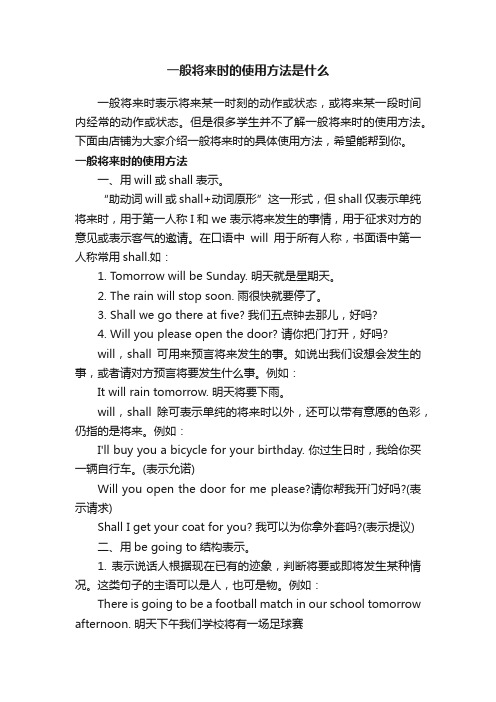
一般将来时的使用方法是什么一般将来时表示将来某一时刻的动作或状态,或将来某一段时间内经常的动作或状态。
但是很多学生并不了解一般将来时的使用方法。
下面由店铺为大家介绍一般将来时的具体使用方法,希望能帮到你。
一般将来时的使用方法一、用will或shall表示。
“助动词will或shall+动词原形”这一形式,但shall 仅表示单纯将来时,用于第一人称I和we表示将来发生的事情,用于征求对方的意见或表示客气的邀请。
在口语中will用于所有人称,书面语中第一人称常用shall.如:1. Tomorrow will be Sunday. 明天就是星期天。
2. The rain will stop soon. 雨很快就要停了。
3. Shall we go there at five? 我们五点钟去那儿,好吗?4. Will you please open the door? 请你把门打开,好吗?will,shall可用来预言将来发生的事。
如说出我们设想会发生的事,或者请对方预言将要发生什么事。
例如:It will rain tomorrow. 明天将要下雨。
will,shall除可表示单纯的将来时以外,还可以带有意愿的色彩,仍指的是将来。
例如:I'll buy you a bicycle for your birthday. 你过生日时,我给你买一辆自行车。
(表示允诺)Will you open the door for me please?请你帮我开门好吗?(表示请求)Shall I get your coat for you? 我可以为你拿外套吗?(表示提议)二、用be going to结构表示。
1. 表示说话人根据现在已有的迹象,判断将要或即将发生某种情况。
这类句子的主语可以是人,也可是物。
例如:There is going to be a football match in our school tomorrow afternoon. 明天下午我们学校将有一场足球赛(已有告示)I feel terrible.I think I'm going to die. 我感到难受极了,我想我快不行了。
![“一般将来时”的几种语法形式[整理版]](https://img.taocdn.com/s1/m/6c03bef44bfe04a1b0717fd5360cba1aa8118c39.png)
“一般将来时”的几种语法形式一般将来时的语法形式主要有四种:shall / will +动词原形;be going to +动词原形;现在进行时和一般现在时。
现将这四种形式分述如下:一、shall / will +动词原形1. will可用于所有人称,但shall 仅表示单纯将来时,用于第一人称I和we,作为will的一种替代形式。
以Y ou and I为主语时通常避免用shall。
例如:He will be back soon. 他很快就会回来。
I shall/will be free on Sunday. 星期天我有空。
Y ou and I will work in the same factory. 你和我将在同一工厂工作。
2. will, shall可用来预言将来发生的事。
如说出我们设想会发生的事,或者请对方预言将要发生什么事。
例如:It will rain tomorrow. 明天将要下雨。
3. will, shall除可表示单纯的将来时以外,还可以带有意愿的色彩,仍指的是将来。
例如:I’ll buy you a bicycle for your birthday. 你过生日时,我给你买一辆自行车。
(表示允诺) Will you open the door for me please? 请你帮我开门好吗?(表示请求)Shall I get your coat for you? 我可以为你拿外套吗?(表示提议)二、be going to +动词原形1. 表示说话人根据现在已有的迹象,判断将要或即将发生某种情况。
这类句子的主语可以是人,也可是物。
例如:There is going to be a football match in our school tomorrow afternoon. 明天下午我们学校将有一场足球赛。
(已有告示)I feel terrible. I think I’m going to die. 我感到难受极了,我想我快不行了。
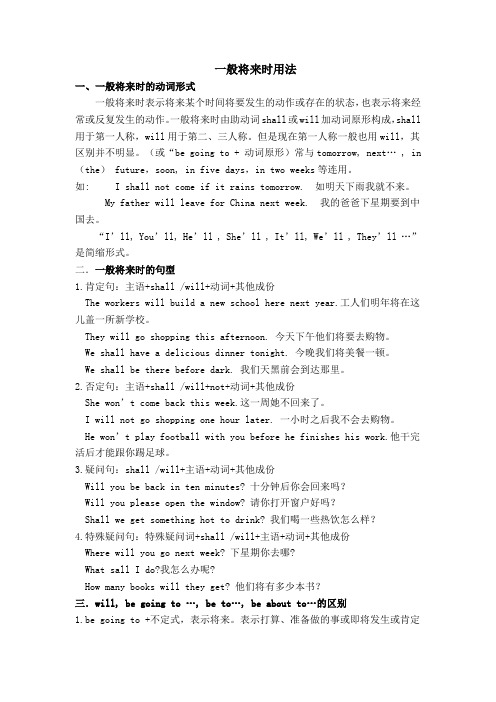
一般将来时用法一、一般将来时的动词形式一般将来时表示将来某个时间将要发生的动作或存在的状态,也表示将来经常或反复发生的动作。
一般将来时由助动词shall或will加动词原形构成,shall 用于第一人称,will用于第二、三人称。
但是现在第一人称一般也用will,其区别并不明显。
(或“be going to + 动词原形)常与tomorrow, next… , in (the) future,soon, in five days,in two weeks等连用。
如: I shall not come if it rains tomorrow. 如明天下雨我就不来。
My father will leave for China next week. 我的爸爸下星期要到中国去。
“I’ll, You’ll, He’ll , She’ll , It’ll, We’ll , They’ll …”是简缩形式。
二.一般将来时的句型1.肯定句:主语+shall /will+动词+其他成份The workers will build a new school here next year.工人们明年将在这儿盖一所新学校。
They will go shopping this afternoon. 今天下午他们将要去购物。
We shall have a delicious dinner tonight. 今晚我们将美餐一顿。
We shall be there before dark. 我们天黑前会到达那里。
2.否定句:主语+shall /will+not+动词+其他成份She won’t come back this week.这一周她不回来了。
I will not go shopping one hour later. 一小时之后我不会去购物。
He won’t play football with you before he finishes his work.他干完活后才能跟你踢足球。
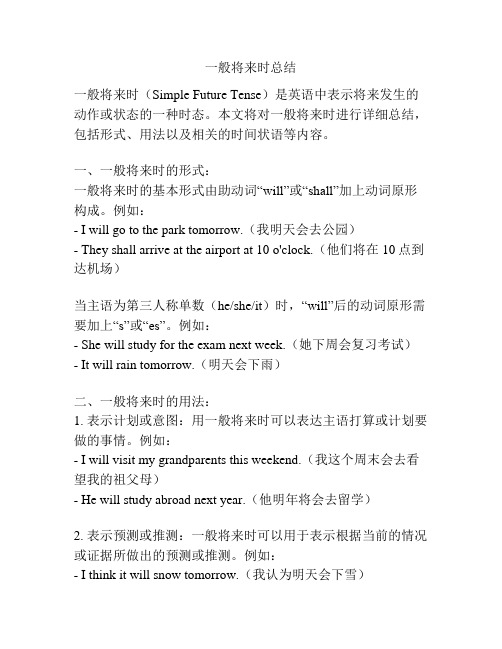
一般将来时总结一般将来时(Simple Future Tense)是英语中表示将来发生的动作或状态的一种时态。
本文将对一般将来时进行详细总结,包括形式、用法以及相关的时间状语等内容。
一、一般将来时的形式:一般将来时的基本形式由助动词“will”或“shall”加上动词原形构成。
例如:- I will go to the park tomorrow.(我明天会去公园)- They shall arrive at the airport at 10 o'clock.(他们将在10点到达机场)当主语为第三人称单数(he/she/it)时,“will”后的动词原形需要加上“s”或“es”。
例如:- She will study for the exam next week.(她下周会复习考试)- It will rain tomorrow.(明天会下雨)二、一般将来时的用法:1. 表示计划或意图:用一般将来时可以表达主语打算或计划要做的事情。
例如:- I will visit my grandparents this weekend.(我这个周末会去看望我的祖父母)- He will study abroad next year.(他明年将会去留学)2. 表示预测或推测:一般将来时可以用于表示根据当前的情况或证据所做出的预测或推测。
例如:- I think it will snow tomorrow.(我认为明天会下雪)- They believe she will win the competition.(他们相信她会赢得比赛)3. 表示意愿或允诺:一般将来时可以表达主语的意愿或承诺要做某事。
例如:- I will help you with your homework.(我会帮你做作业)- He will stop smoking.(他将戒烟)4. 表示预定的事件或安排的计划:一般将来时可以用于表示已经安排好的事件或计划。
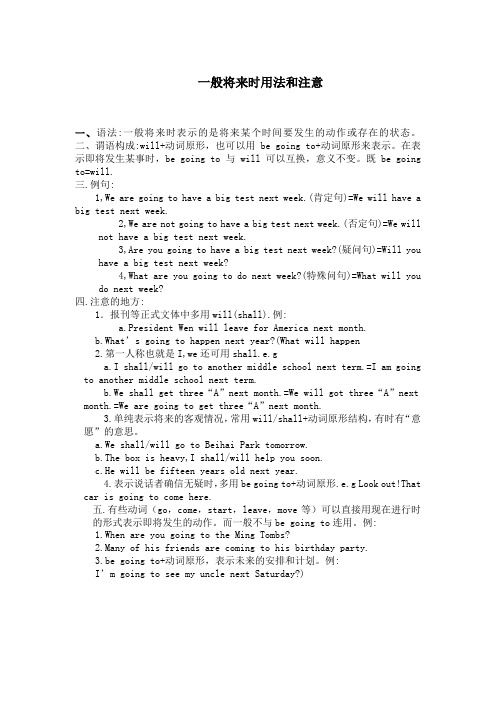
一般将来时用法和注意一、语法:一般将来时表示的是将来某个时间要发生的动作或存在的状态。
二、谓语构成:will+动词原形,也可以用be going to+动词原形来表示。
在表示即将发生某事时,be going to与will可以互换,意义不变。
既be going to=will.三.例句:1,We are going to have a big test next week.(肯定句)=We will have a big test next week.2,We are not going to have a big test next week.(否定句)=We will not have a big test next week.3,Are you going to have a big test next week?(疑问句)=Will you have a big test next week?4,What are you going to do next week?(特殊问句)=What will you do next week?四.注意的地方:1.报刊等正式文体中多用will(shall).例:a.President Wen will leave for America next month.b.What’s going to happen next year?(What will happen2.第一人称也就是I,we还可用shall.e.ga.I shall/will go to another middle school next term.=I am going to another middle school next term.b.We shall get three“A”next month.=We will got three“A”next month.=We are going to get three“A”next month.3.单纯表示将来的客观情况,常用will/shall+动词原形结构,有时有“意愿”的意思。
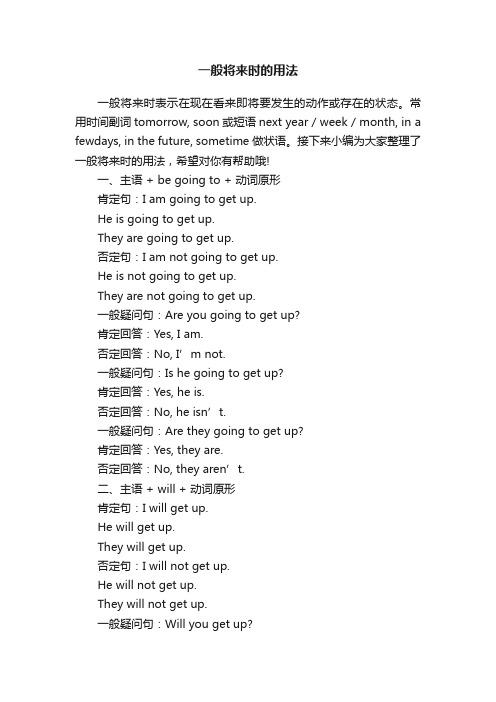
一般将来时的用法一般将来时表示在现在看来即将要发生的动作或存在的状态。
常用时间副词tomorrow, soon或短语next year / week / month, in a fewdays, in the future, sometime 做状语。
接下来小编为大家整理了一般将来时的用法,希望对你有帮助哦!一、主语 + be going to + 动词原形肯定句:I am going to get up.He is going to get up.They are going to get up.否定句:I am not going to get up.He is not going to get up.They are not going to get up.一般疑问句:Are you going to get up?肯定回答:Yes, I am.否定回答:No, I’m not.一般疑问句:Is he going to get up?肯定回答:Yes, he is.否定回答:No, he isn’t.一般疑问句:Are they going to get up?肯定回答:Yes, they are.否定回答:No, they aren’t.二、主语 + will + 动词原形肯定句:I will get up.He will get up.They will get up.否定句:I will not get up.He will not get up.They will not get up.一般疑问句:Will you get up?肯定回答:Yes, I will.否定回答:No, I won’t.一般疑问句:Will he get up.肯定回答:Yes, he will.否定回答:No, he won’t.一般疑问句:Are they going to get up?肯定回答:Yes, they are.否定回答:No, they aren’t.一般将来时/式(The Simple Future tense)时态定义be going to表主观的打算shall和will常常缩写成'll ,紧接在主语之后。
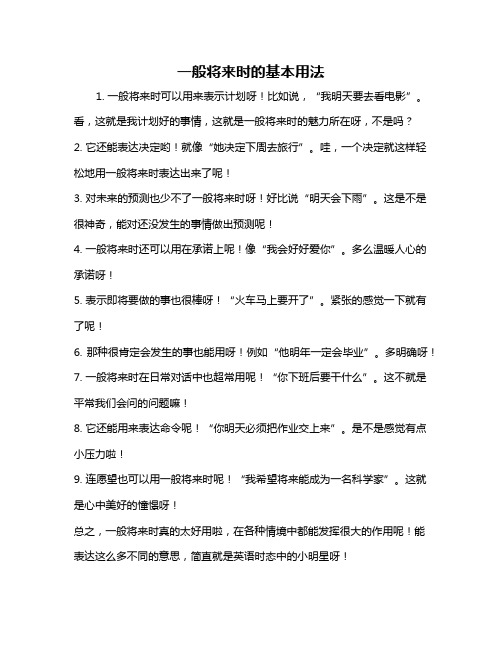
一般将来时的基本用法
1. 一般将来时可以用来表示计划呀!比如说,“我明天要去看电影”。
看,这就是我计划好的事情,这就是一般将来时的魅力所在呀,不是吗?
2. 它还能表达决定哟!就像“她决定下周去旅行”。
哇,一个决定就这样轻松地用一般将来时表达出来了呢!
3. 对未来的预测也少不了一般将来时呀!好比说“明天会下雨”。
这是不是很神奇,能对还没发生的事情做出预测呢!
4. 一般将来时还可以用在承诺上呢!像“我会好好爱你”。
多么温暖人心的承诺呀!
5. 表示即将要做的事也很棒呀!“火车马上要开了”。
紧张的感觉一下就有了呢!
6. 那种很肯定会发生的事也能用呀!例如“他明年一定会毕业”。
多明确呀!
7. 一般将来时在日常对话中也超常用呢!“你下班后要干什么”。
这不就是平常我们会问的问题嘛!
8. 它还能用来表达命令呢!“你明天必须把作业交上来”。
是不是感觉有点小压力啦!
9. 连愿望也可以用一般将来时呢!“我希望将来能成为一名科学家”。
这就是心中美好的憧憬呀!
总之,一般将来时真的太好用啦,在各种情境中都能发挥很大的作用呢!能表达这么多不同的意思,简直就是英语时态中的小明星呀!。
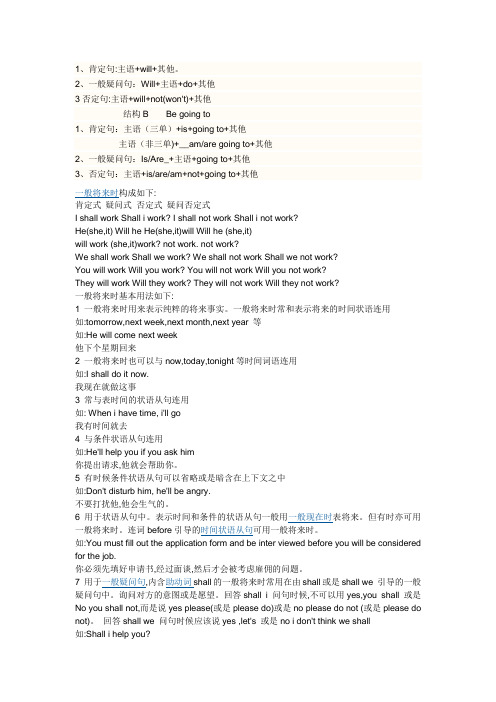
1、肯定句:主语+will+其他。
2、一般疑问句:Will+主语+do+其他3否定句:主语+will+not(won't)+其他结构B Be going to1、肯定句:主语(三单)+is+going to+其他主语(非三单)+__am/are going to+其他2、一般疑问句:Is/Are_+主语+going to+其他3、否定句:主语+is/are/am+not+going to+其他一般将来时构成如下:肯定式疑问式否定式疑问否定式I shall work Shall i work? I shall not work Shall i not work?He(she,it) Will he He(she,it)will Will he (she,it)will work (she,it)work? not work. not work?We shall work Shall we work? We shall not work Shall we not work?You will work Will you work? You will not work Will you not work?They will work Will they work? They will not work Will they not work?一般将来时基本用法如下:1 一般将来时用来表示纯粹的将来事实。
一般将来时常和表示将来的时间状语连用如:tomorrow,next week,next month,next year 等如:He will come next week他下个星期回来2 一般将来时也可以与now,today,tonight等时间词语连用如:I shall do it now.我现在就做这事3 常与表时间的状语从句连用如: When i have time, i'll go我有时间就去4 与条件状语从句连用如:He'll help you if you ask him你提出请求,他就会帮助你。
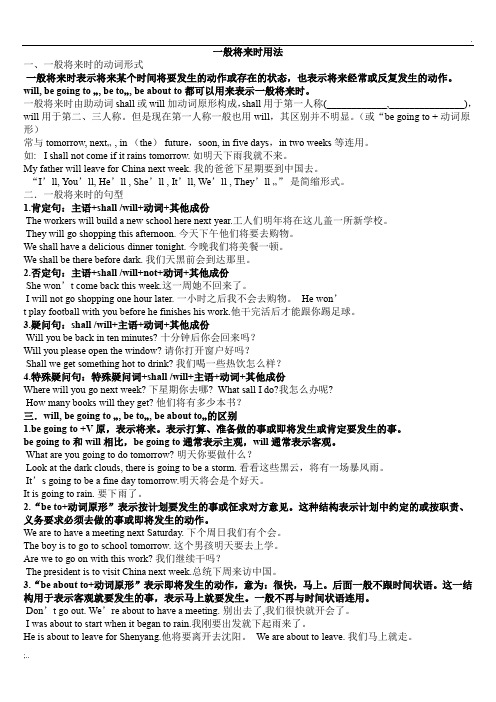
一般将来时用法一、一般将来时的动词形式一般将来时表示将来某个时间将要发生的动作或存在的状态,也表示将来经常或反复发生的动作。
will, be going to …, be to…, be about to都可以用来表示一般将来时。
一般将来时由助动词shall或will加动词原形构成,shall用于第一人称(____________,_______________),will用于第二、三人称。
但是现在第一人称一般也用will,其区别并不明显。
(或“be going to + 动词原形)常与tomorrow, next… , in (the) future,soon, in five days,in two weeks等连用。
如: I shall not come if it rains tomorrow. 如明天下雨我就不来。
My father will leave for China next week. 我的爸爸下星期要到中国去。
“I’ll, You’ll, He’ll , She’ll , It’ll, We’ll , They’ll …”是简缩形式。
二.一般将来时的句型1.肯定句:主语+shall /will+动词+其他成份The workers will build a new school here next year.工人们明年将在这儿盖一所新学校。
They will go shopping this afternoon. 今天下午他们将要去购物。
We shall have a delicious dinner tonight. 今晚我们将美餐一顿。
We shall be there before dark. 我们天黑前会到达那里。
2.否定句:主语+shall /will+not+动词+其他成份She won’t come back this week.这一周她不回来了。
I will not go shopping one hour later. 一小时之后我不会去购物。
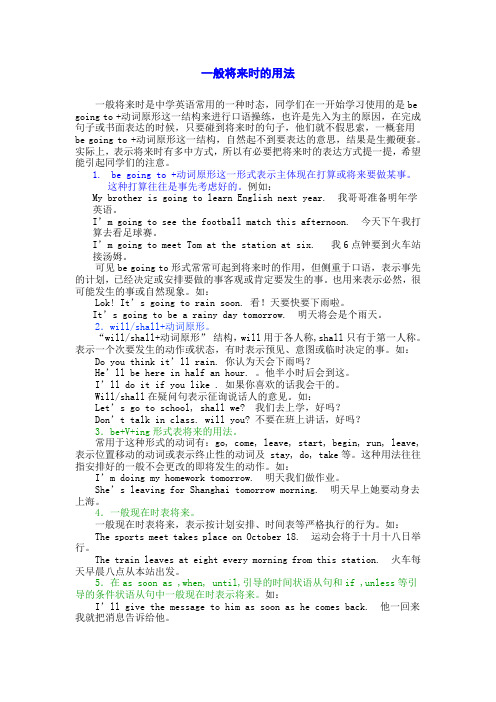
一般将来时的用法一般将来时是中学英语常用的一种时态,同学们在一开始学习使用的是be going to +动词原形这一结构来进行口语操练,也许是先入为主的原因,在完成句子或书面表达的时候,只要碰到将来时的句子,他们就不假思索,一概套用be going to +动词原形这一结构,自然起不到要表达的意思,结果是生搬硬套。
实际上,表示将来时有多中方式,所以有必要把将来时的表达方式提一提,希望能引起同学们的注意。
1.be going to +动词原形这一形式表示主体现在打算或将来要做某事。
这种打算往往是事先考虑好的。
例如:My brother is going to learn English next year. 我哥哥准备明年学英语。
I’m going to see the football match this afternoon. 今天下午我打算去看足球赛。
I’m going to meet Tom at the station at six. 我6点钟要到火车站接汤姆。
可见be going to形式常常可起到将来时的作用,但侧重于口语,表示事先的计划,已经决定或安排要做的事客观或肯定要发生的事。
也用来表示必然,很可能发生的事或自然现象。
如:Lok! It’s going to rain soon. 看!天要快要下雨啦。
It’s going to be a rainy day tomorrow. 明天将会是个雨天。
2.will/shall+动词原形。
“will/shall+动词原形”结构,will用于各人称,shall只有于第一人称。
表示一个次要发生的动作或状态,有时表示预见、意图或临时决定的事。
如:Do you think it’ll rain. 你认为天会下雨吗?He’ll be here in half an hour. 。
他半小时后会到这。
I’ll do it if you like . 如果你喜欢的话我会干的。
一般将来时
一、基本内容
1.构成:“助动词will+ 动词原形”
2.含义及用法:一般将来时表示将来某个时间将要发生的动作或存在的状态,也表示将来经常或反复发生的动作。
3.时间状语:一般将来时常与表示将来的时间状语连用,如:tomorrow, next week, next year, in the future等。
Eg: They will visit Shanghai next week.
People will have robots in their homes in the future.
二、句型转化
1、肯定句:“主语+will +动词原形+其他。
”
Eg: They will have a test next week.
2、否定句:在will 后加 not ,
即“主语+won't +动词原形+其他。
”
Eg: She will be an engineer.(改为否定句)
She won't be an engineer.
3、一般疑问句:将will提到主语前面,
即“Will+ 主语+动词原形+其他?”
回答时使用yes/no.
Eg: He will live in New York in 10 years. (改为一般疑问句并作肯定回答) Will he live in New York in 10 years?
Yes, he will.
三、注意事项
1、Will 常表示客观的将来,也可表示“带意愿色彩的将来”,也可表示“委婉客
气的邀请或命令”
Eg: He will be 18 years olds next month.下个月他将满18岁。
I will tell you all about it. 我愿意把所有与此相关的事都告诉你。
Will you please close the door? 请你把门关上好吗?
2、在疑问句中,主语为第一人称(I 和
we)时,常用助动词shall。
Eg:When shall we have the party ?
3、There be 句型的一般将来时:
肯定句:there will be+.......。
否定句:there won't be+......。
一般疑问句:will there be +......?
肯定回答:Yes, there will.
否定回答:No,there won't.
注:There be 句型的将来时也可为:
There is/are going to be......
4、位移动词可用现在进行时表将来。
5、“be going to +动词原形”也可表示将来的计划或打算。